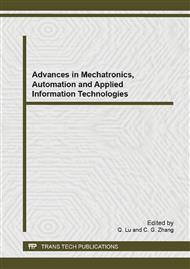[1]
W. Wei: The Application and Research of Cascade control and active compensation of nonlinear systems(Doctor thesis, University of Science and Technology Beijing, China 2010).
Google Scholar
[2]
D. J Xu: Analysis and Control of Low Frequency Oscillations in Interconnected Power Systems(Doctor thesis, North China Electric Power University, China 2004).
Google Scholar
[3]
L.Y. Sun: Design of Nonlinear Robust Adaptive Control for Power Systems Based on Backstepping Method(Doctor thesis, Northeastern University, China 2009).
Google Scholar
[4]
R.Y. Chen,Y. Zhang,Q. Zhong and L. Guo: Transactions of China Electrotechnical Society, Vol. 24 (2009), pp.139-146.
Google Scholar
[5]
Z.J. Hu and Y.S. Zhao: Proceedings of the CSEE, Vol. 30(2010), p.37.
Google Scholar
[6]
B.H. Wang,Q. Zhang and C.W. Yang: Relay, Vol. 32(2004), p.1.
Google Scholar
[7]
P.B. Sanjay and S.B. Dennis: Math. Control Signals Systems, Vol. 17(2005), pp.101-127.
Google Scholar
[8]
Q. Zheng Q.G. Linda and Z.Q. Gao, in: The 16th IEEE International Conference on Control Applications, Singapore(2007).
Google Scholar
[9]
J.Q. Han: Active disturbance rejection control technique—the technique for estimating and compensating the uncertainties(National Defence Industry Press, China 2009).
Google Scholar
[10]
N.A. Ahmad and K.K. Hassan: IEEE Transactions on Automatic Control, Vol. 44(1999), p.1672.
Google Scholar
[11]
K.K. Hassan: Nonlinear Systems(Publishing House of Electronics Industry, China 2007).
Google Scholar
[12]
D.Z. Zheng: Linear System Theory(Tsinghua University Press, China 2002).
Google Scholar
[13]
P.B. Sanjay and S.B. Dennis: SIAM J. Control Optim, Vol. 38(2000), p.751.
Google Scholar


